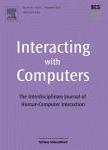版权所有:内蒙古大学图书馆 技术提供:维普资讯• 智图
内蒙古自治区呼和浩特市赛罕区大学西街235号 邮编: 010021

作者机构:Univ Birmingham Sch Comp Sci Birmingham B15 2TT W Midlands England
出 版 物:《INTERACTING WITH COMPUTERS》 (与计算机相互作用)
年 卷 期:2008年第20卷第1期
页 面:128-140页
核心收录:
学科分类:1201[管理学-管理科学与工程(可授管理学、工学学位)] 08[工学] 0812[工学-计算机科学与技术(可授工学、理学学位)]
主 题:Distributed Cognition observational study multiple computers virtual desktops Projected Cognition computer supported cooperative working
摘 要:In this paper, we introduce the notion of Projected Cognition as an extension to Distributed Cognition. Distributed Cognition is a conceptual framework which can be useful in studying human interactions with artefacts;the idea is that of cognition not bounded by the cranium but instead perfusing artefacts in ways that are recoverable. We argue that this analysis has not been fully understood in relation to the behaviour of humans with artefacts in that the intentionality in behaviour has been ignored. We argue that we need to view the human as sometimes projecting their intention in behaviour onto the artefacts they use, and suggest that this conception permits greater clarity in the study of user behaviour with artefacts such as computers. We illustrate the development with case studies of two users of complex configurations of computers as well as examples drawn from the published literature. We conclude with consideration of some design implications and discussion of related domains in HCI where Projected Cognition could be influential. (C) 2007 Elsevier B.V. All rights reserved.